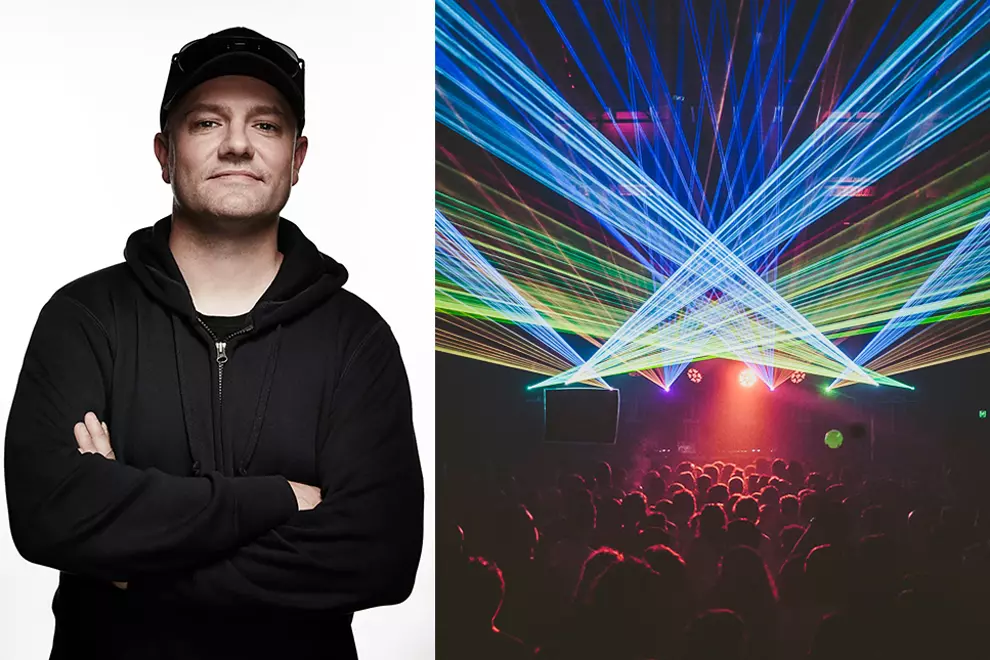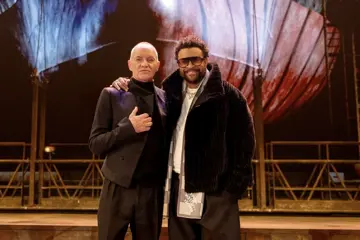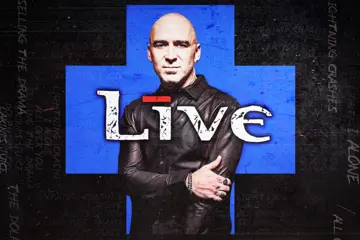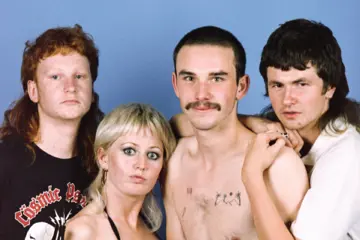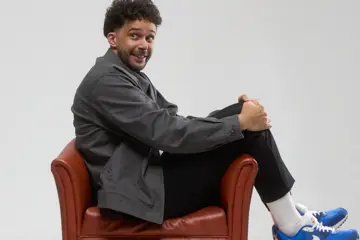The Melbourne dance music identity Richie McNeill still recalls vibing to his first electronic banger. The tween and his best friend would sit on the fire exit stairwell of the now Palace Balwyn Cinema, listening to the soundtracks. One time they tuned into Jean-Michel Jarre's ambitronica. "I remember hearing Oxygène – [in] that final scene in Gallipoli with Mel Gibson," McNeill says. "That was the first electronic track I ever heard in '81." Soon he was exploring underage clubs, revelling in acid house. "Fortunately, I was a teen in the '80s, which to me was the greatest decade of all – the coming of video games, great sci-fi films, electronic music fusing with traditional rock and classical…" McNeill even worked as a busboy at Chasers Nightclub. He'd caught the bug.
THE ORIGIN STORY
A DIY poster boy, the charismatic McNeill would pursue a career in Australia's nascent electronic and dance music industry – DJing and promoting. In 1991, as DJ Richie Rich, he started Hardware Corporation, which developed into a brand encompassing events, a Prahran record store, and a record label (McNeill utilised A&R skills from a stint heading DanceNet at Mushroom Records during the early '90s).
The first Hardware rave happened on New Year's Eve at Melbourne's Mercantile Rowing Club – McNeill DJing with Will E Tell and Hess. The bash sold out – with funds going to charity (McNeill's dad was involved in Try Youth & Community Services). Today Hardware is Australia's longest-standing electronic and dance music events and touring company. And McNeill – who, in 2014, contemplated retiring to focus on family – is still predominantly "running at 100 miles an hour, five-and-a-half days a week." In the past year, the mogul has faced a harrowing case of COVID-19 – he was advised to suspend his beloved renovation projects while recovering – but quips, "I'm down, but I'm not out."
Over three decades, McNeill has proven adept at responding to the generational, technological and sonic shifts reshaping the wider music scene. In the '90s, when the UK Summer Of Love belatedly swept through Australian cities, McNeill helped establish Melbourne as 'Techno City'. Later, he pioneered touring megafestivals like Apollo, Two Tribes and Stereosonic, revolutionising Australia's entertainment business and fuelling the EDM boom. In 2022 Hardware's biggest event is Stereosonic's successor Festival X, a joint venture with OneLove and Live Nation that will return this month – the draws Calvin Harris and, being the hip-hop era, Megan Thee Stallion. Additionally, Hardware stages the boutique Piknic Électronik and, in 2016, partnered with the Brit Carl Cox and Eric Powell to throw the PURE parties.
Don't miss a beat with our FREE daily newsletter
In December, McNeill will kick off Hardware's 30th anniversary celebrations with a massive party, Hardware 30: True Faith – its global bill hitting Sydney, Melbourne and Brisbane. It'll double up as the launch for a commemorative coffee table book, True Faith: 30 – 30 Years Of Hardware, Tales From The Dancefloor, chronicling the history of Hardware, plus the evolution of Melbourne's electronic and dance music movement.
LOST HISTORY
For McNeill, True Faith: 30 is a coming-of-age story – beginning with his memory of hearing Oxygène. The entrepreneur embarked on the project amid the COVID-19 pandemic, a period of collective nostalgia. "To be honest, I didn't realise the awesomeness of what we've done over the last 30 years until COVID and there was nothing to do," he declares. Indeed, in iso, McNeill had time. "I knew the birthday was coming up, and I was gonna be doing something last year, but I didn't know that we'd be in this two-year lockdown thing – and 2021 was out of the picture as well." But he recognised, too, that Melbourne's electronic and dance music scene was little documented – a situation exacerbated by the demise of dedicated media titles, especially the street press 3D World and inthemix, even digital culture ephemeral. "I was like, 'This is shit. We've gotta do something about our history.'" Saliently, McNeill's mate Coxy recently published a memoir, Oh Yes, Oh Yes!.
McNeill lamented that people didn't know about "the legendary clubs" that existed in Melbourne "way before Revolver [Upstairs]," such as The Commerce Club or DJ/promoter Gavin Campbell's Razor – "an institution," INXS frontman Michael Hutchence hanging out with gal pal Kylie Minogue in the back room. Music festivals weren't archived, either. "I was thinking, through COVID, like Big Day Out, Soundwave, Two Tribes, Future Music, Summadayze, Park Life, V Festival [Australia], all of these iconic events that ran throughout the season, including Stereosonic – because we sold it to a US company [SFX Entertainment] that in the US went into bankruptcy – all this history is gone. You can't find it online.

"I went onto Wikipedia to try and update [the entry for] Stereosonic and they said, 'You can't update it…' I'm like, 'I owned the bloody thing and founded it. I wanna update these facts and add more artists that played on the bill – and on that year of 2013…' And they wouldn't let me do it. It was mine!
"It was like, 'This is shit – I can't even update the Wikipedia page on Stereosonic that I fucking founded.' There was all this information missing. So I'm like, 'I've gotta do something about it. Our birthday's coming up. So what am I gonna do?'"
Though the local rave subculture had been chronicled retrospectively, those accounts were incomplete, exclusionary or imbalanced – inevitably promoters' rivalries extending to competing narratives. McNeill commends Paul Fleckney's 2018 tome Techno Shuffle: Rave Culture And The Melbourne Underground as "pretty good," but reckons it privileges Every Picture Tells A Story promoters Hydi and Richard John. "I'm not blowing my own trumpet, but I was there before them," he states. Then, reasonably, articles published by Red Bull and Vice weren't comprehensive. "It's really important, I thought, also from a Melbourne perspective, to give clarity to the history as I've seen it since 1985."
McNeill was keen to stress Kate Bathgate's role as a community radio presenter with her Triple R program Beat In The Street (later Tranzmission). "It had 10s of 1000s of listeners at its peak," he says. "It really drove Melbourne into the forefront of [being the] Australian techno capital – and rave capital. It did so much for me as a promoter, supporting me – and for Every Picture and all of the festivals and the events. We all have Kate Bathgate to thank in the early '90s for that radio show and her support of the scene, and tireless support of our shows, and giving away the tickets and pumping up our shows. We'd advertised on it, of course, as well. But she was such a big part."
Above all, the '80s kid was determined to offer "a tangible artefact." So McNeill linked with Melbourne's Hardie Grant Publishing and journalist Chris Johnston, conceiving True Faith: 30 as "a photo album and a timeline history." "I'm putting money into this – it's not about making money, it's gonna cost me money."
McNeill reached out to colleagues – assembling posters, flyers and photographs. Among his associates was Nick Demkiw, the graphic designer handling much of Hardware's older artwork. Demkiw was himself a DJ/producer in the '90s. Later, he founded the men's streetwear label Autonomy. Now based in California, Demkiw works in the gaming industry under Hess. McNeill likewise liaised with the American Rukes – the self-appointed "#1 DJ photographer", iconic for his 'fish eye' images, who captured Stereosonic.

THE APOLLO PROJECT
In True Faith: 30 McNeill isn't afraid to admit to "failure" – the most crucial Apollo Festival, which nonetheless presented an emerging Daft Punk.
Australia's inaugural major electronic and dance music festival, Apollo was held in February 1998 – a layover year for the Big Day Out. Significantly, the Melbourne leg descended on Docklands, then a post-industrial wasteland.
McNeill (alongside club cohorts Terry Thompson and Jeremy Jolson) teamed up with the seasoned promoter Michael Coppel, their goal to emulate the UK's fabled Tribal Gathering. "We basically sat down with Coppel and he was really open to it," McNeill recollects. "At the time, out of all the rock promoters, Frontier and everyone, Michael Coppel was doing like Rae & Christian and Massive Attack and Faithless… Other than the Big Day Out, Ken [West] and Vivian [Lees], doing it on the Boiler Room [bill], he was the only rock promoter I saw that was doing sort of dancey stuff."
Apollo first hosted both Daft Punk – who'd released their classic debut Homework the previous year – and Basement Jaxx in Australia. Yet, of the French housers, only Thomas Bangalter arrived at the airport – Guy-Manuel de Homem-Christo paradoxically disinclined to fly Around The World due to aviophobia – and he DJed. Also billed was Jeff Mills, the DJ/producer (and Underground Resistance co-founder) leading Detroit techno's 'Second Wave'.
Apollo broke ground by bridging rave, house and techno. Besides, the programming was inclusive with an LGBTQIA+ arena – among the acts Frankie Knuckles, and his collaborator Adeva, Bronski Beat frontman Jimmy Somerville, and the garage diva Ultra Naté, pre-Free. Peculiarly, Apollo's main headliner, Fluke, a UK electronica group, are today largely forgotten. The psy-trance collective Juno Reactor "didn't end up turning up," McNeill says.
Unfortunately, Apollo flopped – at least commercially. "It wasn't successful, it lost money and Coppel didn't wanna do it again the next year – [he] kind of got spooked." However, Apollo generated its own mythology. "It was way ahead of its time." Sydney's Powerhouse Museum possesses a copy of the booklet (OneLove's Frank Cotela created the artwork). Plus the Hardware fold marketed a CD compilation via Central Station (it's available on Discogs).
McNeill went on to initiate Two Tribes as a joint production with his rival Mark James' Future Entertainment when they double-booked the same Docklands' warehouse – their festival playfully named after Frankie Goes To Hollywood's '80s Cold War anthem. Ironically, James – a DJ who was briefly a pop star with the group Bass Culture – had given McNeill a formative DJ residency at his night Pure.
True Faith: 30 covers how "the falling out" of that alliance led to McNeill introducing Stereosonic in 2007 (his partners now including Cotela) – the new megafest astutely scheduled at the start of summer in December. Stereosonic staged EDM superstars – Avicii DJed twice – as well as credible house and techno stalwarts like Marc "MK" Kinchen and Claptone. Alas, McNeill had to navigate a surging drug subculture, particularly the prevalence of ice, with its accompanying media controversy, which saw underground events at Kryal Castle, outside Ballarat, banned following 2007's Ultraworld Festival. In 2013 Stereosonic was acquired (as part of the Totem OneLove Group) by the US SFX Entertainment – the company's late CEO Robert "Bob" Sillerman, a veteran concert promoter on an EDM investment splurge – for a cool $75 million.
 Richie with two of his children at Stereosonic
Richie with two of his children at Stereosonic
POSTER-GEDDON
Admiringly, in True Faith: 30, McNeill acknowledges the Melbourne scene's clashing personalties, intra-crew drama and heightened territorialism. An entire chapter is devoted to the 2000s' infamous poster wars. McNeill feuded with Spiro Boursine, the mercurial founder of Earthcore – an outdoor dance music festival, or bush doof, brand equated with psy-trance, a sub-genre antithetical to techno purists – over street posters. (Disturbingly, in 2018 Boursine died in police custody).
McNeill is still reluctant to identify his nemesis. "It was violent at times," he rues. "I won't mention who, but there was a machete incident, where a promoter put a machete through the vinyl sort of roof structure of a RAV4… I wasn't there, but it definitely happened. There were witnesses and everything else. That was a turning point. It was crazy."
They did attempt a truce. "I had a run-in with [the same] promoter in Greville Street one day, after having a one hour, 45 minute peace meeting about the whole thing. Then I'm in my record store and a customer comes in and goes, 'I've just seen so and so on Greville Street covering your posters with their poster.' I was like, 'What?' I've just been in a meeting with this idiot for an hour and we've just broken bread and finally I thought, after all this heartfelt conversation, this guy had chilled out and we had an understanding. And literally half-an-hour later that code was broken.
"It was wild times and it was totally outrageous and it was at times violent. Now, when I say 'violent', I'm talking about these kinda incidents: pushing and shoving and the machete going through a roof that didn't hurt anyone – [it was] probably more bravado than anything."
GOD IS A DJ
While McNeill delivered electronic and dance music to the masses with festivals, he also transformed local and international DJs alike into household names. In the '90s McNeill's old sidekick Will E Tell commanded such a fervent following in Melbourne techno that, as a support, he often upstaged guests. The DJ launched his own brand, WET Musik, with Simon Digby, but eventually quit music. "He sold all his records to [Sound Of Now DJ/promoter] Jason Midro – that's long gone," McNeill reveals. The Hardware director has lost contact with Will E Tell, who eluded him for Hardware 30: True Faith. "He's in finance, I think," McNeill says. "I think he just got over it and, yeah, just wanted a change and [to] have kids and settle down."
What's more, Hardware championed Jeff Mills, the three-deck wizard who influenced Will E Tell – his '90s track The Bells an enduring Melbourne rave anthem. Mills became a superstar DJ in Australia at a time when other Detroit luminaries expressed disquiet at the incremental marginalisation of dance music's Black innovators. Here, Mills topped the rock-oriented Juice magazine DJ poll over its favoured white crossover contender Fatboy Slim. The Hardware label released an unusual compilation of Mills classics, The Art Of Connecting. Notably, the American chose to play Welcome 2000 at Shed 14, again in Docklands, on the much-hyped New Millennial Eve – a coup for Hardware.
SOUNDTRACK SAGAS
Aptly, for a kid who once tuned in to soundtracks outside a cinema, McNeill has ventured into the world of screen. In the early 2000s he cameo-ed as a DJ in the television show The Secret Life Of Us. McNeill was then music supervisor for the rave flick One Perfect Day, not coincidentally a cautionary tale about party drugs – enlisting the (East) German trance don Paul van Dyk, another Hardware fave. The film, directed by Paul Currie and shot in Melbourne, starred Dan Spielman and Leeanna Walsman, fresh from portraying the bounty hunter Zam Wesell in Star Wars: Episode II – Attack Of The Clones, with newcomer Abbie Cornish in a supporting role. McNeill even ran the night Soundtrack Saga at the aforementioned Revolver. He's currently plotting a documentary tying in with True Faith: 30. "We're in discussion and we've done some research and we've been doing some story development," McNeill teases. "Watch this space, for sure."
ON THE HIGH LINE
Even as Hardware sets trends, McNeill has long tapped into a prevailing nostalgia with 'retro' events like the rave Belfast and, latterly, house Reminisce. In contrast, next month's Hardware 30: True Faith is looking to both the past and the future with what he rightly calls a "diverse" roster. McNeill has booked the legends Richie Hawtin and CJ Bolland. But, he says, Italy's Joseph Capriati, Brazil's Victor Ruiz and Palestine's Sama' Abdulhadi are representing the "new generation".
Curating the party posed challenges for McNeill. "I didn't get everyone that I wanted," he confesses, "but, at the same time, I wanted everybody. It was not really a price thing; it was more just availability of people. But we got the majority of who I wanted."
McNeill hails Hawtin as one of his top three DJs, together with the French Laurent Garnier and Carl Cox – deeming the Brit-Canadian to be "on fire at the moment." Originally synonymous with his acid alter ego, Plastikman, Hawtin advanced minimal techno in the '90s and was touring with Hardware from mid-decade. In 2020 the Plus 8 Records boss aired the riveting club EP Time Warps – a lockdown enterprise. "Richie's at the forefront of technology and such a trailblazer and inspiration," McNeill enthuses. "We're all playing digital records now because of him developing [the DJ software] Final Scratch."
Bolland will perform live. A cult figure in Melbourne rave, the Belgian burst out in the early '90s with his track Horsepower, subsequently remixing Tori Amos' God. He actually furnished the very first volume in the tastemaking DJ-Kicks comp series. And Bolland's It Ain't Gonna Be Me is immortalised on the Human Traffic soundtrack.
The popular Capriati co-headlined Hardware's 2017 winter party Tell No Tales with Hawtin (and made news in the pandemic when he was stabbed). McNeill extols, "Joseph is getting to that top echelon now – he's obviously young and new, he's [been active] the last 10 years – but he's been with us for PURE, and Carl, for a long time, so he was an easy choice. He's turning into one of my favourites definitely now. He just plays a really great selection of techno and house." More buzz again is Abdulhadi, aka the Queen Of Palestinian Techno. She went viral with her Boiler Room set of 2018.
Repping the homegrown side is Adelaide's DJ HMC, aka Carmelo "Cam" Bianchetti, whom McNeill describes as "a really unsung hero." Arguably the Godfather Of Australian Techno, Bianchetti rarely DJs as HMC now, having reinvented himself as the nu-disco Late Nite Tuff Guy (he remixed New Order's People On The High Line for Mute).
Happily, punters can score True Faith: 30 in a bundle deal – McNeill ever the smart business man yet cognisant of legacy. "The thing is to try and get the book in as many hands as possible, especially to some of the newer, younger audience that weren't around then, so they can learn about that history and put a value on it and kind of preserve and respect it." What a plug.
Tickets to Hardware 30: True Faith are available now here; you can pre-order the book here.
HARDWARE 30: TRUE FAITH
Dec 9 – Home the Venue, Sydney
Dec 10 - Sidney Myer Music Bowl, Melbourne
Dec 11 – The Fortitude Music Hall, Brisbane

